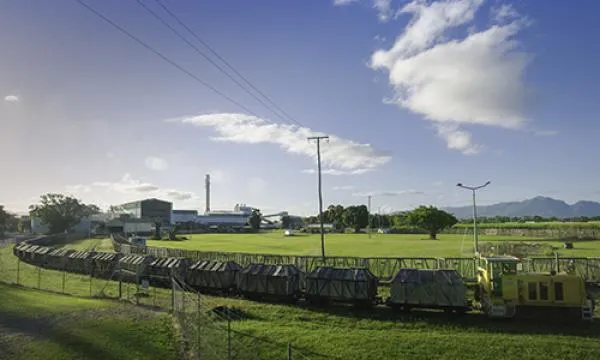
Wilmar's tropical oil and sugar segments could boost Q3 earnings
It is expected to rely on this segment as the swine fever hits soybean meal demand.
The tropical oil and sugar segments of Wilmar International could counter the continuing declines its from oilseeds & grains as the two segments are expected to deliver decent numbers, according to an analysis by RHB.
In Q2, Wilmar’s net profit plunged 52.3% to $208.99m (US$150.88m) in Q2 from $438.23m (US$316.40m), no thanks to lower crush margin for the quarter.
The agribusiness firm stated that the African swine fever outbreak’s impact on soybean meal demand was greater than previously expected.
In contrast, its tropical oils segment reported a 15% YoY growth in pre-tax profit to $245.56m (US$177.3m) thanks to the boost from its stronger performance from the manufacturing and merchandising business. However, its crude palm oil (CPO) prices and production yields went lower. This has resulted in reduced contributions from the plantation business.
But despite the lower CPO prices and production, Juliana Cai, analyst at RHB, expect this segment to further grow.
“Whilst this [lower CPO prices and production] is negative for its upstream segment, Wilmar benefitted from lower input costs for manufacturing and merchandising (mid-stream and downstream). We expect this segment to continue delivering decent numbers in 3Q19,” Cai said.
Meanwhile, its sugar segment had pre-tax loss of $96.12m (US$69.4m) in Q2 from $63.99m (US$46.2m) in Q2 2018. The weaker result was mainly due to the consolidation of Shree Renuka Sugars, which became a subsidiary in June 2018.
Lastly, the others segment’s pre-tax profit of $8.59m (US$6.2m), reversing from its $36.43m (US$26.3m) loss in Q2 2018. This was driven by positive contributions from its shipping and fertiliser businesses.
Furthermore, Wilmar’s joint ventures & associates had lower contributions of $2.63m (US$21.9m) for the quarter as its Chinese associates saw weaker performance. Its interim tax exempt (one-tier) dividend for H1 is $0.03 per share.
However, Cai described its weak performance as seasonal as Q1 is the main milling season for Shree Renuka Sugars, whilst H2 is the main milling season for Wilmar’s Australian subsidiary.
As such, the sugar business in H2 is projected to improve whilst Q2 is likely to remain a seasonally weak quarter moving forward.
In addition, Cai mentioned that the firm’s share price could also climb, supported by its China IPO prospects.



![SBR 5 Lorem Ipsum News 2 [8 May]](https://cmg-qa.s3.ap-southeast-1.amazonaws.com/s3fs-public/styles/exclusive_featured_article/public/2025-05/a_hand_pointing_to_a_futuristic_technology_5b87c9d0e3_3.png.webp?itok=M3Hf-9XR)
![SBR 4 Lorem Ipsum [8 May Top Stories]](https://cmg-qa.s3.ap-southeast-1.amazonaws.com/s3fs-public/styles/exclusive_featured_article/public/2025-05/a_hand_pointing_to_a_futuristic_technology_5b87c9d0e3_2.png.webp?itok=2m5Wl0MX)


![Exclusive three SBR 12 Lorem Ipsum [8 May]](https://cmg-qa.s3.ap-southeast-1.amazonaws.com/s3fs-public/styles/exclusive_featured_article/public/2025-05/a_hand_pointing_to_a_futuristic_technology_5b87c9d0e3_11.png.webp?itok=8kn_UIfA)
![SBR 3 Lorem Ipsum [ Exclusive 2]](https://cmg-qa.s3.ap-southeast-1.amazonaws.com/s3fs-public/styles/exclusive_featured_article/public/2025-05/a_hand_pointing_to_a_futuristic_technology_5b87c9d0e3_1.png.webp?itok=YCyjLegJ)
![SBR 2 Lorem Ipsum [8 May]](https://cmg-qa.s3.ap-southeast-1.amazonaws.com/s3fs-public/styles/exclusive_featured_article/public/2025-05/a_hand_pointing_to_a_futuristic_technology_5b87c9d0e3_0.png.webp?itok=_cKD-29o)

![Video [Event News]](https://cmg-qa.s3.ap-southeast-1.amazonaws.com/s3fs-public/styles/event_news_featured_article/public/2025-05/screenshot-2025-05-08-at-4.58.53-pm_0.png.webp?itok=Kud35sMs)
![Event News SBR 9 Lorem Ipsum [8 may]](https://cmg-qa.s3.ap-southeast-1.amazonaws.com/s3fs-public/styles/event_news_thumbnail/public/2025-05/a_hand_pointing_to_a_futuristic_technology_5b87c9d0e3_8.png.webp?itok=DTh_dbYp)
![Event News SBR 9 Lorem Ipsum [8 May]](https://cmg-qa.s3.ap-southeast-1.amazonaws.com/s3fs-public/styles/event_news_thumbnail/public/2025-05/a_hand_pointing_to_a_futuristic_technology_5b87c9d0e3_7.png.webp?itok=vzDAzb6V)
![Event News SBR 8 Lorem Ipsum [8 May]](https://cmg-qa.s3.ap-southeast-1.amazonaws.com/s3fs-public/styles/event_news_thumbnail/public/2025-05/a_hand_pointing_to_a_futuristic_technology_5b87c9d0e3_6.png.webp?itok=jvHFc4P6)
![Video [Event News]](https://cmg-qa.s3.ap-southeast-1.amazonaws.com/s3fs-public/styles/video_thumbnail/public/2025-05/screenshot-2025-05-08-at-4.58.53-pm_0.png.webp?itok=yZnI0YBb)
![Video 1 SBR [8 May]](https://cmg-qa.s3.ap-southeast-1.amazonaws.com/s3fs-public/styles/video_thumbnail/public/2025-05/screenshot-2025-05-08-at-4.58.53-pm.png.webp?itok=9AAeRz_k)

 Advertise
Advertise

